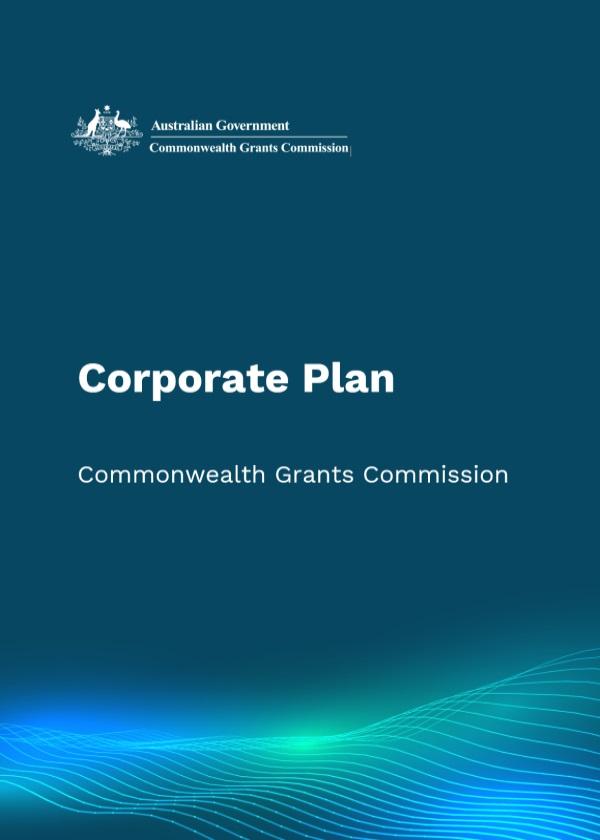Corporate Plan 2018–19

Introduction
As the Accountable Authority, I present the 2018–19 Commonwealth Grants Commission Corporate Plan, which covers the periods 2018–19 to 2021–22, as required under section 35(1)(b) of the Public Governance, Performance and Accountability Act 2013.
For 85 years, the Commonwealth Grants Commission has contributed to the financial arrangements underpinning the Australian federation, thereby significantly influencing the capacity of each government of Australia’s States and Territories to provide a standard of services to the people in their jurisdiction that is the same as is found in other jurisdictions. Since 2000, the CGC has provided advice on the distribution of GST revenue through a detailed annual assessment of each jurisdiction’s relative fiscal capacity. Leading into the 2020 Review, our focus is to embody our core principles and values of independence, broad stakeholder engagement, excellence in research and analysis, transparency, good governance and accountability into all the work we do.
Our strategic planning process provides the opportunity to shape our future and focus our efforts on those areas that are most important in delivering our core functions, including recognising the need for continual improvement and healthy work practices necessary to remain a contemporary place to work.
Michael Willcock
Secretary
Commonwealth Grants Commission
31 August 2018
Purpose
The Commonwealth Grants Commission’s (CGC) purpose is to provide advice and recommendations to the Australian Government on the relative fiscal capacities of the States and Territories as the basis for distributing GST revenue to achieve fiscal equalisation amongst the States and Territories.
The CGC’s purpose will be pursued through:
- research and analysis that is high-quality and fit-for-purpose
- effective secretariat support to the Commission’s Chair and members
- sound corporate governance and financial management.
The CGC is an advisory body only. It does not administer government programs or grants.
Values
In conducting its business, the CGC has the following core principles:
Independence ~ provide the Government with apolitical advice that is frank, honest, timely and based on the best available information.
Stakeholder Engagement ~ extensive consultation and collaboration with the States and Territories to build consistent, open and respectful working relationships.
Excellence in research and analysis ~ the credibility of the CGC relies on the quality of its research, analysis and reporting.
Transparency ~ share its knowledge and operate in an open and transparent way that provides an assurance to the Australian community.
Accountability ~ maintain good governance through compliance with the Public Governance, Performance and Reporting Act 2013, the Public Service Act 1999, and the specific additional governance requirements under the Commonwealth Grants Commission Act 1973.
Environment
Government interim response to the Productivity Commission Inquiry into HFE
The Government’s interim response to the recommendations in the Productivity Commission’s final report into HFE are to be considered through the Council on Federal Financial Relations. It is possible that the Government’s final response to the Productivity Commission’s inquiry may affect both the 2019 update of GST revenue sharing relativities as well as the 2020 review of methods.
Information
Data capture, use, access, release and analytics that drive data sharing and connection, and better informed advice presents an ever evolving challenge in the modern digital, information and communication environment. With expectations that information is made more accessible, enhancements will be made to systems, access and sharing capabilities to ensure the CGC promotes data availability and use.
Whole of Government Policy
To ensure the CGC is well placed to achieve its key objectives in the current environment, work streams have been established to modernise the supporting information technology and communication systems. Compliance with whole of government policy remains a focus as the CGC implements internal policy and procedures that are agile, scalable and supportable within the broader framework of risk management and control.
Performance
The CGC’s outcome is:
Informed Government decisions on fiscal equalisation between the States and Territories through advice and recommendations on the distribution of GST revenue.
The effectiveness of the Commission’s advice and recommendations is assessed by:
|
Performance Indicator |
Measurement |
|---|---|
|
Excellent research and analysis |
Through greater transparency and robust assurance processes, provide stakeholders with analytical work of a technically high quality. |
|
Stakeholder Engagement |
Facilitate a greater understanding of fiscal equalisation principles and opportunities for stakeholders, particularly State and Territory governments, to place their views before the Commission. |
|
Responsiveness to Government |
Enhanced strategic focus on the supporting fiscal equalisation framework and emerging government priorities. |
Capability
As a small statutory authority within the Treasury Portfolio, the CGC is focused on attracting and retaining a highly skilled and motivated workforce, specialising in economics and statistical analysis. Their expertise and professionalism is critical to both the production of high-quality reports, and building and maintaining good stakeholder relationships.
The Commission collaborates and partners with external stakeholders to influence change, drive improvement and to maximise effort and resources. To meet the demands of a rapidly changing workforce demographic, the CGC is focused on providing a refreshed working environment that is more collaborative, flexible and mobile in nature.
Risk oversight and management
The CGC has systems of risk oversight, management and internal control which are committed to the continuous improvement of risk management practices in line with the Commonwealth Risk Management Policy. The CGC’s Risk Management Framework incorporates a Policy, Risk Register and Business Continuity Plan.
Our Audit and Risk Committee provides independent assurance to the Accountable Authority on the CGC’s financial and performance reporting responsibilities, risk oversight and systems of internal control. This includes reviewing the proposed internal audit coverage to ensure the approach taken is focused on the CGC’s key areas of financial and operational risk.
In our approach to risk management, we consider factors that may affect our ability to effectively engage, and manage our relationships, with our stakeholders. Our risk appetite sets the boundaries within which staff are expected to operate and is vital for effective risk management. A clear understanding of risk appetite helps staff assess risks, make informed decisions, confidently engage with risk and harness its opportunities.
